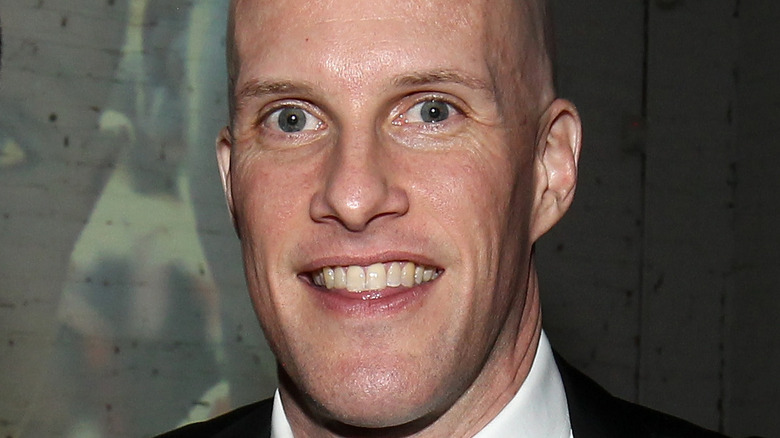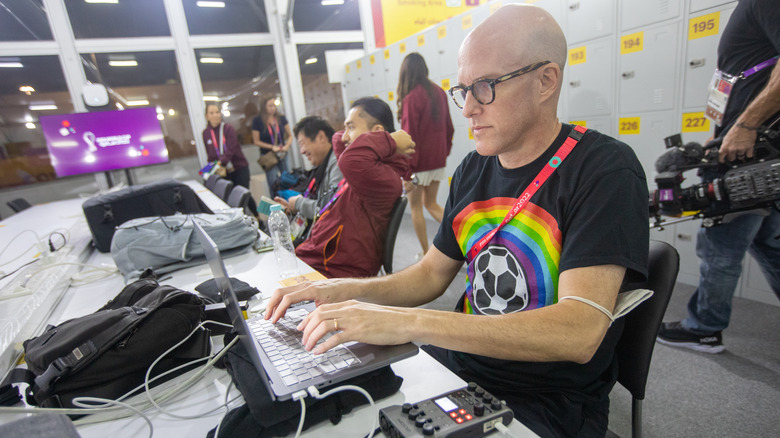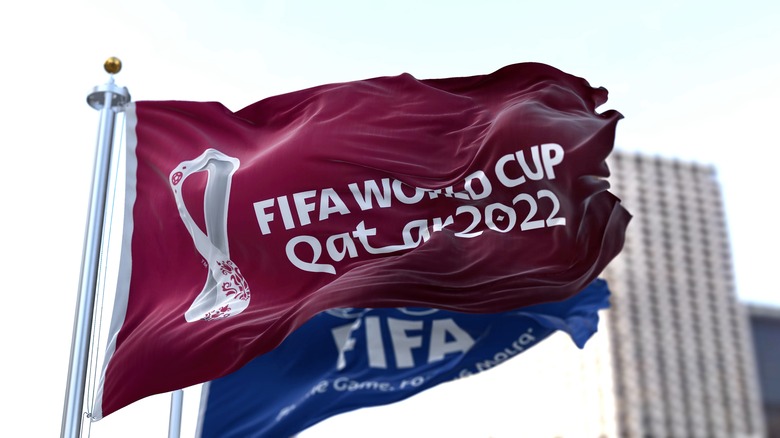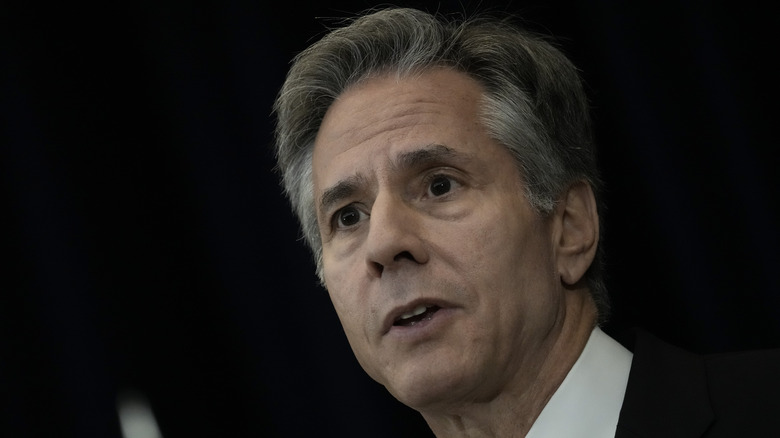Grant Wahl's Rainbow-Colored Controversy At The 2022 World Cup Explained
Before the United States had its first kick-off at the 2022 World Cup in Qatar, American soccer journalist Grant Wahl was facing his first penalty. On November 21, 2022, Wahl said he was detained by security staff after he wore a soccer T-shirt that had an LGBTQ+ rainbow prominently displayed on it as he tried to enter Qatar's Ahmad bin Ali Stadium for the U.S. match against Wales (per NBC Sports). "You have to change your shirt. It's not allowed," one guard told Wahl, according to a tweet he posted. At first, Wahl, who works for CBS Sports and writes a popular Substack newsletter, was given no explanation as to why the shirt was forbidden. Eventually, he got a hint. "One security guard told me that my shirt was 'political' and not allowed," Wahl wrote on Substack.
Wahl also said his phone was forcibly ripped from his hands as he tried to tweet more about it. "Another continually refused to give me back my phone," he wrote. "Another guard yelled at me as he stood above me — I was sitting on a chair by now — that I had to remove my shirt." All the while, Wahl was refusing to change his shirt, arguing it wasn't political in nature. Soon, he was briefly joined in detention by a friend — a journalist at The New York Times — who simply asked what was happening to Wahl. The friend was quickly released, while Wahl remained.
He's finally released
In all, Grant Wahl said he was detained for about 25 minutes before a higher-ranking official came along. "Then a security commander approached me," Wahl wrote on Substack. "He said they were letting me through and apologized. We shook hands. One of the security guards told me they were just trying to protect me from fans inside who could harm me for wearing the shirt." He added: "A FIFA rep later apologized to me as well." Wahl, who wore the shirt in solidarity with the LGBTQ+ community, said he was eventually allowed to enter the stadium with the shirt on — something he said he was promised would never be a problem in the first place.
Wahl later said he planned to wear other items in support of the LGBTQ+ community throughout the tournament. "It's really important to me and it's not required by any stretch of the imagination," he told CNN. "I've got family members who are gay. I've got friends who are gay. I've got journalist friends who are gay who are here in Qatar." During the interview, Wahl said that he had been thinking about recent events, including the mass shooting in Colorado Springs at the LGBTQ+ bar, Club Q. "I was thinking all sorts of stuff," Wahl told CNN. "And if I have to be detained for 30 minutes, it's kind of annoying. But it's not an issue for me. And so I was glad to at least help out a little bit."
Wahl asks about LGBTQ+ Qataris
Still, the event had Grant Wahl asking bigger questions beyond his experience. "[T]he entire episode left me wondering: What's it like for ordinary Qataris who might wear a rainbow shirt when the world isn't watching here? What's that like?" he asked on Substack. Wahl's readers were glad he was asking questions that went beyond himself. "Proud of you, Grant. Your question about what happens to ordinary LBGTQI Qataris who don't have your connection or visibility is an important one," wrote one reader. However, in some ways, the answer is straightforward. In Qatar, homosexuality is illegal, and sex between men is punishable by as much as three years in prison (per CNN).
A report by Human Rights Watch released just one month before the opening ceremony of the World Cup found a series of human rights violations by the security forces in Qatar against LGBTQ+ people. Those violations included detention without charge, verbal harassment, and physical abuse until they signed a pledge promising to "cease immoral activity," per Human Rights Watch. "While Qatar prepares to host the World Cup, security forces are detaining and abusing LGBT people simply for who they are, apparently confident that the security force abuses will go unreported and unchecked," said Human Rights Watch researcher Rasha Younes (via Human Rights Watch). "Qatari authorities need to end impunity for violence against LGBT people. The world is watching."
FIFA's stance
For its part, FIFA seems to leave rules and interpretation ambiguous. The organization's handbook says (via CNN) that "expats and tourists are free to wear the clothing of their choice, as long as it is modest and respectful to the culture." But before the World Cup even began, the limits of FIFA's claim of inclusion were being tested in Qatar. Captains and players from several countries had planned on wearing rainbow armbands under a #OneLove campaign that was meant to support equality and inclusion in the LGBTQ+ community. However, in Qatar, homosexuality is illegal, and FIFA threatened to impose sanctions against countries and players for wearing the armband, per Time. A joint statement from the countries' captains said they were willing to accept paying fines but couldn't put the players in a position of further sanctions.
FIFA's move also drew the attention of the top diplomat in the U.S., Secretary of State Antony Blinken (above), who was critical of soccer's governing organization for its stance on the armbands. "It's always concerning from my perspective when we see any restrictions on freedom of expression. It's especially so when the expression is for diversity and for inclusion," Blinken told reporters (via The Hill). "And in my judgment, at least, no one on the football pitch should be forced to choose between supporting these values and playing for their team." For its part, Qatar told CNN, "Our track record has shown that we have warmly welcomed all people regardless of background."



